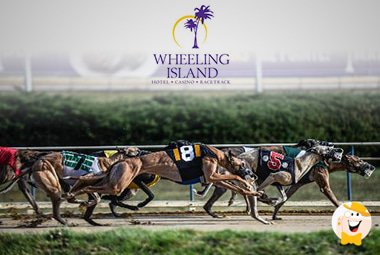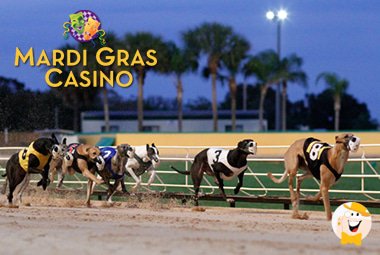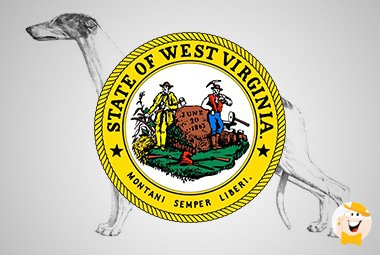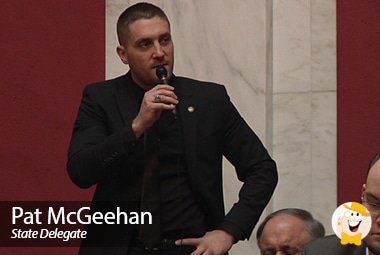
Stay with me for just a second here because I promise this is going somewhere. This work is about more than the Breeders Fund of the State of West Virginia, it just so happens that provides a backdrop for how ridiculous gambling-related Legislation can get. The full and proper name is the, ‘Greyhound Breeding Development Fund,’ and before we can do anything with it, we must first discuss why it exists.
The History:
The history of the Breeders’ Fund is basically the same as the history of casino gambling in the State of West Virginia. Prior to proper casinos, greyhound and horse racing was the sum of any commercial gambling action in the state, and the state’s tracks operated with varying degrees of success over several decades. In the case of Wheeling Island Hotel-Casino-Racetrack, it began its history as an establishment known only as, ‘Wheeling Downs,’ which opened for thoroughbred racing in 1939.
Wheeling Downs had a proud and largely successful few decades on its half-mile oval and expanded to harness racing in 1961. Unfortunately, the grandstand would suffer a fire the very next year and it, ‘Burnt to the ground.”
Being local, I am aware that it took significant reinvestment to rebuild the grandstand and that the Downs were not really profitable enough to justify doing so until some outside money came in on the project. The grandstand was eventually rebuilt six years later, and after thoroughbred events lasting a little over a month, the property switched entirely to harness racing.

Harness racing would continue for nearly a decade after the thoroughbred racing came to an end, but it was still difficult to operate even that profitably. Dog racing was cheaper and opened up to significant public interest causing the property to run profitably. The property, as well as the greyhound industry in general, enjoyed significant revenues and popularity for well over a decade, but that fell off as the public lost interest.
Despite best efforts to renew the public interest in the, ‘Sport,’ the woes of the greyhound tracks continued and West Virginia was one of the first states, after Nevada and New Jersey, to legalize and regulate some form of commercial gambling.
The first newly minted, ‘Casino,’ to enjoy the privilege of being able to operate as such was Mountaineer Casino. That location offered horse racing (and still does) and was permitted to offer 165 Video Lottery Terminals (VLT’s) it would be well over a decade before the state would expand to allow table games.
Fifteen percent of the revenues of these VLT’s were to be devoted, at that time, to be pumped into purses in order to support the racing industry. The initiative was largely successful, and in 1994, the State expanded to allow a casino presence at any of the state’s racetracks with up to 400 VLT’s provided 15% of Gross Revenues would be devoted to racing funds.
In a way, this measure had the desired effect of the VLT revenues being used, in part, to support the racing industry. Perhaps ironically, though, some of the handle that would have otherwise been wagered at the tracks was instead itself diverted to the VLT’s. In that sense, the casinos did nothing to revolutionize or renew the interest in racing...they made people even less interested in the live horse or greyhound racing.

Furthermore, many of the people that were once interested in greyhound racing are simply dying off. The vast majority of young people do not consider it an attractive gambling option, and many (perhaps including this writer) consider it to be unfair to the animals who have no choice but to do it. Greyhound tracks all over the country have closed for just these reasons, with simulcasting locations benefitting from those few tracks that have remained open.
The fact of the matter is that a particular location for either simulcast or live racing largely only benefits from the handle that is wagered at that location. In the case of both Wheeling Island Hotel-Casino-Racetrack and Mardi Gras Casino (the other greyhound track in the state) both live and simulcast handle wagered at the locations of the tracks has gone down remarkably over the last several years.
Found that, between 2004 and 2013 live handle dropped by 57% at Wheeling Island and simulcast handle based on wagers taking place at Wheeling Island dropped by 37%.
In other words, West Virginia authorized a limited number of casinos back in 1994 (with one in 1990) in order to help support its ailing racing industry hoping for a comeback. However, the prospects for the racing industry have only continued to get worse and show no potential signs of recovery.
The casinos lose so much money on greyhound racing that they have actually approached Legislature to request fewer racing days on the calendar despite the fact that their subsidies to the breeders fund are a fixed percentage of gambling revenues anyway. In other words, the tracks in and of themselves occasionally cost the casinos less money not running live races even though the casinos have to pay into the fund anyway.

The Breeders Fund would be more appropriately deemed the, ‘Purse Fund,’ as it is nothing more than a successful area of the casinos subsidizing a failing area of the casinos. In other words, as was intended back in 1994, the casinos are forced into taking money from a profitable aspect of their operations and dumping it into a failing aspect of their operations. In the case of Wheeling Island, for example, 95% of the purses came from the subsidies in 2013. Without the subsidies, which it cannot be stated enough are positive revenues from other areas of the casino, there is no way that the tracks themselves could exist. They would simply lose too much money.
The amount of money that contributes to the purses by way of live handle is negligible compared to the amount of money that the casino is subsidizing. In fact, in 2013, the purses at Wheeling Island (by themselves) exceeded the live handle! In other words, the races paid the owners of the animals more than the amount actually being bet on the races! If the monies bet were simply a charge for the pleasure of watching the dogs live, and there were no subsidy, the breeders would actually have made less money in 2013. That’s how bad the industry has gotten.
The earlier economic impact study also found that well over 60% of the greyhound purses went to greyhound owners outside of the State of West Virginia. Granted, that does not mean that the trainers or facilities are outside of the state, (they usually aren’t) but it does mean that what few people are profiting do not live in the state. In other words, the casinos are forced to subsidize an industry that has absolutely no chance of making money using revenues from their operations that do make money.

In 1994, all of this made at least a minute amount of sense. There was thinking that the casino gambling might draw some interest to racing operations at the tracks. The result, had it worked out that way, would be new customers for the casino side as well as new customers for the track side. What actually happened was that the casino side had new customers, and some of the few customers that enjoyed the track side moved over to the casino.
Over the next more than two decades, racing operations have continued to lose more and more money as the casinos are forced into operating an unprofitable venture. Perhaps worse, the casinos are forced to fund said unprofitable venture with revenues that might otherwise be profits for them.
In the study linked above, Wheeling Island acknowledged that greyhound racing had been break-even to very slightly profitable for them, but only on the premise that they have to pay into the Breeders Fund in the first place. Essentially, if they were not forced into paying 15% of their Gross Gaming Revenues into the fund, then greyhound racing would cease to be in any way profitable and they would instead be taking a huge loss on it. This is clear from the substantial decreases both in live handle as well as simulcast betting actually taking place on property.
Given all of that, one would think I would be on board with the current Bill that has passed the House and Senate (waiting for the Governor’s signature) to eliminate the Breeders Fund.
Why I Am Not On Board with the Bill to Eliminate the Breeders Fund
The problem with the current bill to eliminate the Breeders Fund is that the State of West Virginia is not eliminating the requirement that the casino devote a percentage of its revenues to the fund, they are simply moving where the funds are going. Due to a budget shortfall in the state, the state wants to allocate the money to its own general fund.
My issue with that is the money never belonged to the state to begin with. The casinos were forced to use a percentage of their revenues to subsidize their racing operations, but how does the state giving the casinos the right to discontinue racing operations make that money belong to the state? The state originally allowed the casinos to be in place in order to save the greyhound industry and what the state found was an unbelievably strong source of tax revenues on the taxes on gaming revenues.
Simply put, allowing the casinos was always a good idea and saving a failing racing industry was arguably always a bad one.

Rather than eliminate the Breeders Fund and allow the casinos to enjoy more of the fruits of their success, perhaps to make property improvements in other areas, the state has unilaterally decided, “Fine, but if there are no greyhounds, we’re taking this greyhound money.” The point is that while the state technically, ‘Collected,’ the revenues to distribute to the fund, the money always belonged to the casino, not to the state. The state was simply forcing the casino to invest its own money in an unprofitable segment of its operations.
Granted, the Greyhound Breeders Fund should be taken off of the casinos and the two casinos permitted to decide whether or not they want to continue to offer greyhound racing. (They won’t, in fact, it’s tough to say whether or not they’ll even continue to have simulcast) That is the kind of bill that I would support, but not a bill that effectively just increases the tax obligations on the casinos Table/Slot revenues when there are already existing tax requirements in place.
My problem with this bill is not that it kills the greyhound industry, the greyhound industry has been lying in a coma for decades. My problem with this bill is that it steals from the casinos.
Granted, were it not for the actions of the State of West Virginia, the casinos would not exist. However, the state did not bring the casinos into existence for benevolent reasons or invest any of its own money to effectuate the existence of the casinos. The state permitted the casinos to exist because some special interests in the racing industry were probably in the pockets of politicians and did just enough to convince them that it was the only way for the racing industry to survive. Other politicians (correctly) thought the casinos would just be a great source of tax revenue, same reason that West Virginia was one of the first states to legalize limited video lottery locations.
The difference is that these things were all done legitimately. The casinos went into the deal knowing that they would have to dump a percentage of their gross gaming revenues into a failing segment of the establishment’s operations. Had the casinos been told that, even after operating a failing gambling segment for decades, the state was just going to unilaterally shut it down and start stealing the money directly...they might not have been on board with that.
The redistribution of these revenues has literally never benefitted the casinos at all. By dumping over ten million dollars into the segment annually (and treating it as though they hadn’t on the books) that segment was able to operate at break-even or a very slight profit. If we consider the case of Wheeling Island, where the subsidy makes up some 95% of the purses, the conclusion we reach is that the casino is actually losing just slightly less than 95% of the total purse amount annually.
The bottom line is that it’s stupid. It’s not profitable for the casinos, it’s not profitable for the state and it benefits only a small handful of individuals. The people who theoretically stand to benefit the most, for the most part, do not even live in the state. Those same people maintain that a single greyhound kennel is a $3,000/week investment, but again, that’s because it’s just a damned stupid industry! Speaking personally, I had a pet greyhound once, it didn’t cost me $3,000/week and it was a fine dog. It didn’t race, but I taught him how to roll over and give me his paw.

State Delegate Pat McGeehan says it even better than I do.
“It’s a poor way to go about things,” he said. “They are only acting on this not because they think it’s right and proper, but because they don’t want to cut their spending in Charleston. If anything, we should just give the tracks their own money back — not simply strip what little they get back from all of the special taxes placed on them, diverting it all to the government.”
The fact of the matter is that the State of West Virginia is faced with a budget deficit, and no matter how you look at it, the state is effectively deciding to steal from someone.
If you are like me and believe that the casinos should not have to subsidize the unprofitable greyhound tracks, then you would conclude that the state ending the fund and taking the money from the casinos on direct is stealing from the casinos.
If you believe that the Breeders Fund should continue to exist, then the state is simply stealing money from all of those associated with the greyhound industry.
Either way, the state has unilaterally decided to take money that it has absolutely no right to.
It should also not be forgotten that the State of West Virginia is very much on the high end when it comes to the direct taxation of the casinos’ electronic gaming and table gaming operations. While the casinos opened and operate such things knowing what the tax would be, how much the tax actually benefits the public is something of a question mark.
For instance, casinos that are allowed to retain a greater percentage of their revenues might be able to continuously reinvest in their own properties thereby drawing more visitors from closer casinos and, as a result, garnering more revenue. If a casino is very successful in this regard, then the state in question might even be able to cut out a lesser amount as a tax on the revenues yet still make more money as the casino succeeds in drawing more money overall.
The only aspect of this Legislation, which now sits on Governor Jim Johnson’s desk, that is even at all fair is that the two casinos in question will no longer have to offer racing. Of course, that is only a small consolation after two decades of losing money (via the subsidy) on it and having to maintain the facilities.
The casinos will also be decoupled from the tracks, which means that they will not be forced to stay in the same location as the physical tracks. However, the casinos themselves must remain in the counties in which they currently exist. The only incentive a casino would have to build an entirely new property (they can only operate at one location at a time) would be if it got them out of some sort of local tax that was so onerous as to justify the construction of an entirely new establishment. One would assume that it is very doubtful that is the case, especially with both casinos having made substantial renovation investments within the last decade.

Conclusion:
While I have always wanted to see this fund eliminated so that the casinos could stop wasting their money subsidizing a failing industry, I did not want to see that elimination come only so the state could pilfer some revenues that do not belong to them by any stretch of the imagination. Even if those monies would legitimately be used for the public good, that does nothing to change the fact that the state has no right to them by any stretch of the imagination.
Furthermore, as much as I disagree with the existence of the sport (in general) I also find it difficult to accept the state effectively. Putting an instant death sentence on these breeders (the purse fund would run out on July 1st) and the individuals who work with the dogs is simply to garner revenues that they have no right to.
I have never been a fan of greyhound racing, but I am also not a fan of outright theft and that is what the State of West Virginia is doing with this bill one way or another. The only real question is not whether or not they are stealing, but who they are stealing from. In my opinion, it is the casinos.
Although, the greyhound racing does have to come to an end as it has reached the point of absurdity. Eventually there will be dozens of breeders and trainers at the track with one guy working the betting booth. The guy working the betting booth will be there on the off chance someone wants to come in and place a wager. That is because someday the last fan of greyhound racing will be where most of the others have already went, in his grave.






Mission146 7 years ago
7 years ago
I'm not much of a fan, either, and even less of one when continuing to offer the sport makes no financial sense.
Please enter your comment.
Your comment is added.
rferry5 7 years ago
7 years ago
i will never understand this sport of racing dogs or horses seems like a lot of people are addicted to these gambling sports I think it should be outlawed feel bad for those animals that they race i mean those animals look like they are going to drop dead after a race thanks rose
Please enter your comment.
Your comment is added.